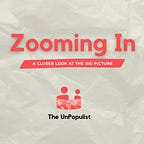Listen to Zooming In at The UnPopulist in your favorite podcast app: Apple Podcasts | Spotify | Google Podcasts | RSS
Aaron Ross Powell: Welcome to Zooming In, a project of The UnPopulist. I'm Aaron Ross Powell. Today, we have our editors' roundtable where I'm joined by Shikha Dalmia and Akiva Malamet, to talk about liberalism and the left.
A transcript of today’s podcast appears below. It has been lightly edited for flow and clarity.
Shikha Dalmia: Hi, Aaron. Thank you for doing this. This is our second or third roundtable, and these are getting to be more and more fun. It's a big topic that you have laid out here but let me just back up and state what the purpose of The UnPopulist, and to some extent, this podcast is. I think it's fair to say that all three of us have occupied more of the center-right than the center-left position in our years as public intellectuals. Akiva's are far shorter than mine because I'm 500 years older than him. What we are trying to do now is—at least for me, and I don't want to speak for you guys.
For me, I realized at some point that my understanding of the left was very much mediated by this universe that I inhabited. The biases of this universe crept into my mental categories. What at least the purpose of The UnPopulist is what I call is to rethink all that and create a new “common ground, classical liberalism,” which is not uncritically pro-right and reflexively anti-left. We want to understand the left on its own terms and evaluate its relationship with liberalism. I think our side has suffered from its fusion with the right for the last half a century or more, and we need to rethink this fusion and build bridges with the left where we can.
This can't, of course, be done completely uncritically, and at this stage, Aaron, you've had a fair number of critical race theorists and leftist-progressives on your podcast. At The UnPopulist we've invited several of them to write for us. I think we have a baseline of understanding to begin to critique the left, free of the noise that the hysterical right is injecting into our understanding of the left not just in America right now, but the world. The question is, once you get rid of all the noise that Chris Rufo and other right-wing anti-woke cultural warriors are making, what do we make of it?
It's been eye-opening to read the left in its own words and fully understand its critique of racism in America. I didn't come to it until about four or five years ago, but now I'm fully persuaded that there is such a thing as “structural racism.” That just because we've made a great deal of progress in ameliorating individual racism, doesn't mean that structures of racism don't exist. There is such a thing as “white privilege,” although I don't like the term. I much prefer the “dominant privilege” because it's not a racial thing, it's a question of dominant group privilege.
I've been persuaded by much of what the left has said. Yet there are disagreements, and we'll get into a little bit of that in this podcast. Let me just throw out the one disagreement that I have with the left and its framing. What comes through to me is a certain reflexive anti-Americanism. In this it's very interesting, anti-Americanism has always been there on the left, but now there are plenty of right-wing warriors who have their own form of anti-Americanism, and the two take somewhat different forms.
We ran this piece by Jonathan Marks yesterday pointing out how overblown the right-wing concern about DEI on college campuses is. In the course of writing this piece, one of the things he mentions is that Chris Rufo claims that American college campuses are more oppressive than Soviet communism, and he thinks that Hungary is actually more of a paragon of freedom and free speech than the United States is. This is a pretty shocking statement coming from the right, and quite a departure from its exceptionalism—that America is an exceptional country and it's exceptionally good and what have you that the right used to—has been believing, and a lot of portions of the right still do.
Then you see the opposite on the left, which is that America is somehow a more oppressive country than other countries. In your podcast with Gillian Branstetter of the ACLU, which was again, a really, really eye-opening podcast about the plight of trans people in the country, she mentions that there is no difference between the United States and some of the more oppressive regimes that we have seen in the past. There is this horseshoe convergence between the left and the right going on. The question is, and both—frankly the right mystifies me a little bit more than the left. I think one of the reasons that there is this anti-Americanism on the left is that they are suspicious of American capitalism.
They see American capitalism as the source of oppression in this country. They see American capitalism as leading to chattel slavery, which is a uniquely American institution There was domestic slavery and there were other kinds of slavery [in other places and times], but chattel slavery was a very American institution in that you were breaking up Black families and selling them in this market transaction.[Editor’s Note: Chattel slavery, which allows families to be broken up and sold like movable property separate from the land, dates back to ancient Babylon, but what was different in the New World, especially America, was racial chattel slavery]. I think although it's understandable, but it is also this anti-Americanism because of American capitalism is also a huge misunderstanding on the part of the left. I think that's one area in which I disagree with them, because capitalism is not the same as markets.
“One of the reasons that there is this anti-Americanism on the left is that they are suspicious of American capitalism.
They see American capitalism as the source of oppression in this country. They see American capitalism as leading to chattel slavery... There was domestic slavery and there were other kinds of slavery, but chattel slavery was a very American institution in that you were breaking up Black families and selling them in this market transaction.”
—Shikha Dalmia
Aaron Ross Powell: I think there's a lot of interesting stuff in there, and I want to add my own gloss to it and maybe push back on a bit of it. First, you mentioned that we came from this center-right perspective, and I don't think that really accurately describes me because I think one of the things that, one of my intellectual evolutions over the last 10 years is recognizing how a lot of the people who were on my side, making the same sorts of pro-liberalism arguments were part of—thought of themselves as being on the right.
I really, really don't, and I tend to—my overlap with the left is in a lot of the fundamental values of cosmopolitanism, strongly anti-hierarchy, anti-domination, seeing usually tradition and ideas of what is like natural hierarchies as simply self-serving methods of control. Generally, the values that motivate the people on the left are much more, I think, amenable to my own personal values than those that motivate people on the right. Where I disagree with the left is in how we bring those values into being, how we realize those in the society and the politics and the economy around us.
I think the real blind spot of the left is in seeing there is domination and oppression in society right now. There are groups that are wildly marginalized that are being crushed under the boot of either unjust social pressures or coercive physical pressures. The way that we solve this and all the other problems we've identified is to strengthen the state and have it intervene more on behalf of our favored groups and to stop intervening on behalf of the groups in power, the dominant culture, the people on the right, so on and so forth. I can understand that thought process.
I can see there is this incredibly powerful tool that has not just a huge amount of resources it can bring to its disposal, but it can also exercise coercive force to bring this about through law, through regulation, and so on. That is appealing, but I think the history of the state is that almost invariably, powerful states end up being tools of oppression as opposed to tools of liberation. Recognizing that and reconceptualizing the state as force, as opposed to—perhaps necessary force, maybe there are problems that it's the only thing that can solve. But it's not just all of us getting together and making collaborative decisions.
It's rather an institution with its own interests and a tremendous amount of power that can do a tremendous amount of harm. That said, I think that on the anti-Americanism, there has always been two things going on. The first is that American culture is incredibly pro-American in often a way that blinds it to just how awful the American government has been in all sorts of ways, and how much real injustice there has been in our history, our foreign policy, our treatment of marginalized groups and racial groups. There's a whitewashing that happens, and that needs to be corrected.
Sometimes I think there's a temptation to overcorrect or to see—and that can turn into—"we are much worse than everybody else,” which as you pointed out, I think rightly, there are plenty of places that are as oppressive as America can be—I really liked Gillian's point in that podcast about how authoritarianism is just unevenly distributed in the US. There are some people who feel very free. There are other people who feel incredibly crushed by the government. Recognizing that, but not swinging too far in the other direction, and there's a temptation to do that.
The other thing that I would say is, I think on the capitalism, this is something I've increasingly noticed over the last several years, is that capitalism means different things to different people. The term is not consistent in its usage. Those of us on the classical liberal side tend to use capitalism as simply a synonym for free markets. People on the far left don't tend to use it that way. They tend to use it as the system of concentrated power, large corporations often using government in rent-seeking ways. The power of bosses as a result of an inability of workers have options to move, and so on and so forth.
“Capitalism means different things to different people. The term is not consistent in its usage. Those of us on the classical liberal side tend to use capitalism as simply a synonym for free markets. People on the far left don't tend to use it that way. They tend to use it as the system of concentrated power, large corporations often using government in rent-seeking ways. The power of bosses as a result of an inability of workers have options to move, and so on.”
— Aaron Ross Powell
They see it as a system of domination and not simply free markets. A lot of the times when people say they oppose capitalism, that's what they mean. They don't mean just free exchange between private individuals in a non-coercive way. Part of the reason that I think this—I'll note there were studies—there's surveys done of college students a few years ago that showed that they had a very low opinion of capitalism, but a very high opinion of entrepreneurship. Lots of people were confused about that. If you recognize that they basically—capitalism means something different than simply free markets and free enterprise, then it makes a lot of sense.
I also think that this history that we've talked about plays a big role in this, because one of the things you noticed is that a lot of people who ended up very far left or ended up actually in the early to mid-20th century becoming communists, their attraction to those ideas initially was not, "I don't like free markets, free enterprise and capitalism." The reason that they ended up in those circles is because they were post-civil rights, they were anti-racial oppression, they were in favor of women's liberation, they opposed fascism, reasons like that. At the time, the people who were talking about that kind of stuff saying, "We need to end racial hierarchies," and so on, they happened to be the communists and the far-left people.
The people who were talking about capitalism and free enterprise and free markets were also the ones who were the most opposed to the civil rights movement. You can see this play out in anti-communism. I just recorded an episode with Kristin Du Mez that will be out next week as we're recording this right now. One of the things we talked about was anti-communism was rife among American evangelical movements. Simply what they meant by communism was basically the civil rights movement. If you cared about civil rights, you started hanging out with leftists, and then you also happened to pick up opposition to markets. It wasn't the opposition to markets that led a lot of these people into the left in the first place.
The opposition to capitalism was often driven by these people who want to keep me at the bottom of the hierarchy, who want to keep Jim Crow, who want to keep patriarchy, are also talking capitalism. Obviously, capitalism must be involved in that stuff too. I think a lot of it was driven by really poor alliance choices and rhetorical choices. I think if we recognize that, it gives us a way to have richer conversations with people on the left about actually markets are—it's not government that's the tool of liberation that you're seeking. It is radically free markets that have historically and continue to be this tool. Please don't smother them, but instead embrace them so that we can smash these hierarchies that markets exist in opposition to.
“It's not government that's the tool of liberation that you're seeking. It is radically free markets that have historically and continue to be this tool. Please don't smother them, but instead embrace them so that we can smash these hierarchies that markets exist in opposition to.”
— Aaron Ross Powell
Shikha Dalmia: So eloquent, Aaron. I almost 100% agree with you, but I'm still going to find something to push back on over here. Two very quick points, because Akiva has a lot to say on all of this, I know. One, your point about the uneven distribution of authoritarianism in this country. That's indubitably true. That's a great quote by Samuel Johnson: “Why do you hear the biggest yelps about freedom from the biggest slave drivers in this country?” Something to that effect. (Editor’s Note:“How is it that we hear the loudest yelps for liberty among the drivers of negroes?”) That summarizes that point about the uneven—America has been an authoritarian country and worse for Blacks. No doubt about that.
Still, the one small point I would make is one of the mistakes that the left makes is that it thinks that the default condition of humanity is freedom and not authoritarianism, whereas the reality is that every social order is in some ways totalitarian. It perpetuates itself by all kinds of very complex social mechanisms, worldviews, ideologies, taboos, what have you, to control the mind of the people so that they will believe in that social order. Where that doesn't happen is in liberal societies. Because of all the liberal norms, free speech, free thought conscience, freedom of conscience and what have you, you get tools to actually question that totalitarianism.
“One of the mistakes that the left makes is that it thinks that the default condition of humanity is freedom and not authoritarianism, whereas the reality is that every social order is in some ways totalitarian.”
— Shikha Dalmia
If you compare other countries with the United States their record on human rights at least in the modern period, in the last 100 years is far, far worse than the United States. If they took a somewhat, if the left took a somewhat non-parochial, broader international perspective, I think it would allow them to see some of the progress that has been made in the United States.
That's point number one, and the other very brief point I'll make is I think there is a lot to what you said about the whole notion of capitalism and markets getting conflated with the right because of the right’s opposition to civil rights folks. Martin Luther King was just a commie, even though he was actually fighting for some very American values and principles—but I think we cannot underestimate the role that suspicion of the profit motive plays in the antipathy to markets. Not just on the left, but actually also on the right.
Akiva Malamet: I liked a lot of what Aaron had to say. I agree with a lot of his response to Shikha, and like Aaron, I came to a classical liberal point of view from basically adopting many of what I consider to be left-wing values. Values about liberty, equality, opposing social control, opposing hierarchy and domination. I actually started out my political journey on the right, and my move towards being a liberal was very much about adopting certain values and points of view that I hadn't previously appreciated. I think there is a danger in thinking about left-wing opposition to liberalism merely as a function of either the coalitions that they perceive liberalism as a part of, or a misunderstanding of terms.
I don't think that the divide between liberals and the left, and we should acknowledge that the left is not a monolithic thing. It's a kind of vague sociological term for people with a lot of different, and sometimes contradictory ideas, just like any political ideology. But I don't think that the only issue is that when the left thinks about capitalism, they think about corporations in bed with government and when liberals think about capitalism, they think about free exchange. I think there are aspects of—even when you're talking about markets that the people on the left are fundamentally suspicious of. They’re suspicious of the idea of profit. They see it inherently as a form of exploitation.
They're suspicious of the idea of people having some—of the idea of anyone holding something privately because they see the idea of holding something privately as basically theft from the commons of humanity. They think of property and of resources as something that ought to be held in common or perhaps can be more efficiently held in common. Obviously, it depends on the leftist person you're talking to. There's a suspicion of holding capital and property in private hands to begin with. Also, one of the defining features of the left, especially in comparison with liberalism, is an insistence on equality as the most important value.
I think of liberalism as a doctrine that tries to balance liberty and equality, and it sees both of these as important, but it sees them as a balancing act between these two values. I think of the leftist people who say that equality is much more important than liberty in a lot of cases that liberty leads to exploitation. If we don't have some kind of egalitarian distribution of not only material goods but of social relationships and a variety of other ways that society is organized, that there's going to be a lot of problems.
I think a lot of my differences with the left come from the fact that I'm willing to accept certain forms of inequality, particularly when they're achieved through properly free markets rather than capitalism and corporate rent-seeking. I don't have a kind of ideal that all property or social relations should be collectivized. I think that holding private property is a necessary tool for achieving both justice and efficient distribution of resources. I think that the gains that people make through the use of private property, through the use and through the acquisition of profit is in many cases morally justified and is certainly on a utilitarian basis, a necessary requirement for any functioning society.
“I think a lot of my differences with the left come from the fact that I'm willing to accept certain forms of inequality, particularly when they're achieved through properly free markets rather than capitalism and corporate rent-seeking. I don't have a kind of ideal that all property or social relations should be collectivized. I think that holding private property is a necessary tool for achieving both justice and efficient distribution of resources.”
— Akiva Malamet
I think what also divides people on the left from those who defend markets is that- and from liberals, in general, is that people on the left see markets as an inherently conservative force. They're a force that reinforces hierarchy that is about some people having stuff and other people not having stuff, about relations of exploitation and domination. There are many people who are liberals who have fundamentally conservative views about why we need markets. They see markets as an upholder of privilege and of the justly set out hierarchies based on race and gender and so on.
They actually see defending markets as part of the program of defending hierarchy. Sometimes, there is a genuine divide because some liberals believe in hierarchy rather than in true equality between people. That creates a divide as well. Now, as a liberal, I would say that the reason we should have markets, because they're liberatory, because they remove people from historical situations of exploitation and domination. I recognize that not everyone who defends markets thinks like that, and that there are many people who see markets as a preserver of hierarchy.
There are good reasons for people on the left to see people who defend markets as their enemies in terms of the values that they have in place. Obviously, this depends a lot on who we're talking about and what their particular version of their ideology is. I think another important thing to look at is, and this is a complicated thing because I think there are different versions of this depending on the ideology you hold, but I'm a big fan of Thomas Sowell's book, A Conflict of Visions, which is about how a lot of political divides are between what he calls the “constrained” and the “unconstrained vision” of human nature.
The “constrained vision” is in some sense, small “c” conservative. It sees people as self-interested to some significant degree. It has skepticism about human perfectibility and the degree to which humans can learn new things and morally improve. It has skepticism about the degree to which we can live in a perfectible world, a world with less scarcity, a world without injustice. The “unconstrained vision” believes in moral perfectibility and the ability to overcome all situations of injustice.
To some extent, I am more skeptical than some people on the left of the ability to live in a world that is truly bereft of scarcity, of injustice, of self-interest, of greed, of rent seeking. I see the role of social institutions as balancing the inevitable features of humanity that will engage in exploitation and predation and so on. I don't think we can ever live in a world where there is no exploitation or greed or self-interest or limits to our knowledge.
“To some extent, I am more skeptical than some people on the left of the ability to live in a world that is truly bereft of scarcity, of injustice, of self-interest, of greed, of rent seeking. I see the role of social institutions as balancing the inevitable features of humanity that will engage in exploitation and predation and so on. I don't think we can ever live in a world where there is no exploitation or greed or self-interest or limits to our knowledge.”
— Akiva Malamet
I think there are people on the left who really genuinely think that absent the structures of domination, that we would be able to live in a better world, in like—Star Trek is a great example of that vision where everyone's living in harmony and nobody's poor and nobody has any stuff. John Lennon's Imagine is kind of a parody of this, but it does reflect a certain idealism that many people on the left have about the possibilities for social reform that I simply don't have. In that sense, I am more “conservative” than some people on the left, even though I don't think of my values as being fundamentally very different, in the sense that I care about equality and non-domination and liberation.
Shikha Dalmia: Very quickly, I'll interject and say, Akiva, I describe myself as a “Burkean progressive,” which is that I believe in, and I agree with many of the social justice causes of the left, but I also believe in a certain amount of incrementalism and maintaining of the institutions of a liberal society. In that sense, actually, Aaron, your formulation about a radical case for the emancipatory potential of markets and what have you—It is radical in the end that you get to a much better place, but I really do believe in the incrementalism approach as minimizing the damage that we do on our way to a better, more socially just society.
Aaron Ross Powell: I think you can square that circle by saying that one of the things that I think attracts people on the left but also on the right to state power is its immediacy. I often have made the joke that you really—you couldn't have had, say, a libertarian version of the West Wing TV show because it would have been really boring because everybody would walk into President Bartlet's office and say, "Here's a problem. What are you going to do about it?" He would say, "Well, we're going to let an emergent process take care of it." No, what you want is, "I am going to do this thing, and it's going to be immediate, and it's going to fix it." There is a strong appeal to that immediacy.
Yes, I think that markets are radically liberatory. That liberation happens through emergent processes that are not an overnight thing and requires a degree of trust in that process. Picking up on what Akiva said, I think the point about the left is not monolithic is really important. Just as on the right, there is a world of difference between a David French and a Tucker Carlson. To the point where it doesn't—we would group them together on the right, but there's almost no meaningful overlap between their views. We might find a handful of issues, but they're incredibly distinct. The same thing holds true for on the left, a Joe Biden versus a Marxist.
The right likes to accuse all the Democrats of being Marxist, but Marxists are deeply offended by that because they dislike the Democrats as much as the right does. There's a real diversity. I think oftentimes when we are saying “the left hates markets,” we're using this particular version that is not very representative of most people on the left's views to represent the whole case. That said, I think also picking up on something you said, Shikha, about a sense of provincialism and a lack of comparison between the institutions we have now and the alternatives.
This is a really striking feature of both the radical left but also just a lot of the left in general, is a lack of knowledge of institutional comparison, like comparative institutional analysis and institutional history. I was struck for—we have a little book club in the Reimagining Liberty Discord, and recently we read Mark Fisher's book Capitalist Realism, which is a modern classic of Marxist thought. He was a British Marxist writer. It has all sorts of fun Marxist cultural analysis of what he terms “late capitalism” culture. What really stands out in it is almost every time he identifies a problem in capitalist society, whether that's in power relations or in wealth disparities, or in control by different groups or whatever, he never follows up with, is this problem worse than it used to be?
Did this problem exist in pre-capitalist societies? How does this problem compare to non-capitalist institutions? In almost every instance of a problem that he raises, which are often genuine things that would be better if they were ameliorated, I could immediately think of, well, in this pre-capitalist society, people were talking about the exact same problem. It's probably not caused by capitalism, or it seemed to have been a lot worse in societies that did away with markets. Maybe capitalism has this problem, but the alternatives that we've seen don't seem to be any better or are remarkably worse.
That lack of looking into basically institutional arrangement comparison—or in contemporary issues like we passed this policy, whether it's minimum wage laws or we're going to have public sector unions or whatever it happens to be, issues that the left is in favor of. Did it actually work? Did it solve the problem that it set out to solve? Did things get better? Did they get worse? What new relationships of domination have been created? Not a lot of effort is put into answering those questions.
As a result, for a lot of people on the left, the policies that they advocate for, either historically have not actually made things better in a direction that they desire, or have made things worse, or the new policies they're advocating for don't appear that they would actually fix the problem. A lot of my frustration with people on the left is not the underlying values are wrong, but they're actually advocating things that are counterproductive from their own standpoint. It's out of this lack of curiosity about comparisons.
“For a lot of people on the left, the policies that they advocate for, either historically have not actually made things better in a direction that they desire, or have made things worse, or the new policies they're advocating for don't appear that they would actually fix the problem. A lot of my frustration with people on the left is not the underlying values are wrong, but they're actually advocating things that are counterproductive from their own standpoint.”
— Aaron Ross Powell
Shikha Dalmia: Both of you have had different intellectual evolution from mine, but the reason I was attracted more to the libertarian right was precisely because of that. It just seemed to me that the policies that liberals were advocating would make things worse precisely on their own count. Just to explore this question of why the left is so against markets and capitalism. I think just to give it its due a little bit, one reason is the advent of the nation-state.
It's like the modern nation-state and the advent of capitalism went hand in hand. Adam Smith, we are celebrating his 300th birth anniversary, I mean he pointed this out—mercantilism. The British government and the Empire were very, very closely tied. It would be interesting—I'm sure somebody has written about this, whether this modern form of capitalism would've looked different if we also hadn't had the evolution of a nation-state the way we see it. It may have looked much, much different if we had still lived back in the ancient city-states instead of nation-states.
That said, since we are talking about this relationship of the left with liberalism, the other thing that really bothers me about the left is their rejection of liberalism on many counts. In their zeal, in their impatience for what Akiva is talking about, like a utopia now, they see and what you said, Aaron, that the state is such an attractive tool. It's immediate. You can use it. You can wield it. You can get results, and when you combine those two instincts, for using state power and certain moral zeal for results now, this impatience, you see the same illiberalism creeping in some sectors of the left, which is troubling.
“When you combine those two instincts, for using state power and certain moral zeal for results now, this impatience, you see the same illiberalism creeping in some sectors of the left.”
— Shikha Dalmia
I am so sick of the both sides-ism—I'm not just sick of the hysteria of the right against the left, but I'm also sick of this both sides-ism, that both sides are equally a problem. That's clearly not the case, the right is in a far worse place. The closest thing to an authoritarian we have seen in America comes from the right, and not just in America, everywhere in the world. The right seems to me to be much more comfortable with state power than the left is, but on the other hand, to the extent that many of our progressive friends see things like, free speech as just a tool of oppression or that all the liberal values—toleration—as a tool of pushing the status quo, I think that's a problem.
In your interview with Gillian, she herself acknowledged that one of the biggest victories for trans rights came through, I forget the name of the case that she mentioned (Bostock vs Clayton County), in which a conservative Supreme Court 6-3 ruled in favor or ruled against discrimination against a trans person because of their sexuality. Just the application of liberal tools can take us very far in ameliorating some of the injustices and the inequalities that we see these days. I wish they would have a little bit more faith in liberalism, because the record of liberalism in achieving results is slow, but not bad, very good, in fact, I would say.
Akiva Malamet: I think for a lot of people on the left and people on the right, there's this dream that the only world we can accept is one in which everything that I want is fulfilled, and in which society is oriented towards an overall collective goal or purpose, or if you want to be a fancy academic, they call it a “telos.” From the left it's, we can only accept a world in which society is fundamentally oriented towards reducing domination, increasing social justice, getting rid of all of these unjust relationships. For the right it's, we can only accept a world in which we're all practicing the same religion, or we're all the same ethnic group, or we have the same traditional values or something.
Everyone needs to be marching in lockstep in this collective dream, where we're all oriented towards the same things, and the structure of society is built on achieving those ends, whether there are these social justice ends, or these more traditionalist hierarchical ends. I think one of the things that's fundamental to liberalism is the recognition that people have different ends, that people want different things, that they care about different things, that they have different preferences, and because people are different, there's always going to be a tension between us because we have different stuff that we want to accomplish in life, and that we think is valuable.
This is core to the idea of, this is a big thing for John Rawls and for Robert Nozick, this idea of separateness of persons, that each of us is an individual with our own understanding of the world and what matters. Therefore, the only society that is justifiable is a society that can allow us to balance out the fact that we all have different goals and ends and purposes. That I think is a fundamental consideration of liberalism. It's also why tolerance is what basically created liberalism, and why the fight for religious and ethnic and social tolerance was what made liberalism emerge out of the feudal system of Europe hundreds of years ago.
Recognizing that we live in a world of deep difference and deep pluralism, and in a world of scarcity and constraints in what we're able to accomplish, is what should orient us towards a more liberal society, rather than a society where we're trying to achieve some broad collective identity.
“Recognizing that we live in a world of deep difference and deep pluralism, and in a world of scarcity and constraints in what we're able to accomplish, is what should orient us towards a more liberal society, rather than a society where we're trying to achieve some broad collective identity.”
— Akiva Malamet
Aaron Ross Powell: Thank you for listening to Zooming In at The UnPopulist. If you enjoyed the show, please take a moment to review us on Apple Podcasts, and also check out Reimagining Liberty, our sister podcast to The UnPopulist, where I explore the emancipatory and cosmopolitan case for radical social, political, and economic freedom. Zooming In is produced by Landry Ayres and is a project of The UnPopulist.
© The UnPopulist 2023
Follow The UnPopulist on Twitter (@UnPopulistMag) and Facebook.
















